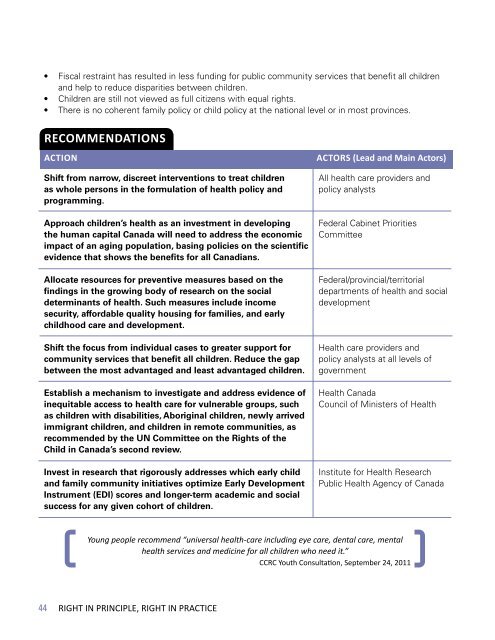CCRC report on rights of children in Canada - Canadian Coalition ...
CCRC report on rights of children in Canada - Canadian Coalition ...
CCRC report on rights of children in Canada - Canadian Coalition ...
You also want an ePaper? Increase the reach of your titles
YUMPU automatically turns print PDFs into web optimized ePapers that Google loves.
• Fiscal restra<strong>in</strong>t has resulted <strong>in</strong> less fund<strong>in</strong>g for public community services that benefit all <strong>children</strong><br />
and help to reduce disparities between <strong>children</strong>.<br />
• Children are still not viewed as full citizens with equal <strong>rights</strong>.<br />
• There is no coherent family policy or child policy at the nati<strong>on</strong>al level or <strong>in</strong> most prov<strong>in</strong>ces.<br />
Recommendati<strong>on</strong>s<br />
ACTION<br />
Shift from narrow, discreet <strong>in</strong>terventi<strong>on</strong>s to treat <strong>children</strong><br />
as whole pers<strong>on</strong>s <strong>in</strong> the formulati<strong>on</strong> <strong>of</strong> health policy and<br />
programm<strong>in</strong>g.<br />
Approach <strong>children</strong>’s health as an <strong>in</strong>vestment <strong>in</strong> develop<strong>in</strong>g<br />
the human capital <strong>Canada</strong> will need to address the ec<strong>on</strong>omic<br />
impact <strong>of</strong> an ag<strong>in</strong>g populati<strong>on</strong>, bas<strong>in</strong>g policies <strong>on</strong> the scientific<br />
evidence that shows the benefits for all <strong>Canadian</strong>s.<br />
Allocate resources for preventive measures based <strong>on</strong> the<br />
f<strong>in</strong>d<strong>in</strong>gs <strong>in</strong> the grow<strong>in</strong>g body <strong>of</strong> research <strong>on</strong> the social<br />
determ<strong>in</strong>ants <strong>of</strong> health. Such measures <strong>in</strong>clude <strong>in</strong>come<br />
security, affordable quality hous<strong>in</strong>g for families, and early<br />
childhood care and development.<br />
Shift the focus from <strong>in</strong>dividual cases to greater support for<br />
community services that benefit all <strong>children</strong>. Reduce the gap<br />
between the most advantaged and least advantaged <strong>children</strong>.<br />
Establish a mechanism to <strong>in</strong>vestigate and address evidence <strong>of</strong><br />
<strong>in</strong>equitable access to health care for vulnerable groups, such<br />
as <strong>children</strong> with disabilities, Aborig<strong>in</strong>al <strong>children</strong>, newly arrived<br />
immigrant <strong>children</strong>, and <strong>children</strong> <strong>in</strong> remote communities, as<br />
recommended by the UN Committee <strong>on</strong> the Rights <strong>of</strong> the<br />
Child <strong>in</strong> <strong>Canada</strong>’s sec<strong>on</strong>d review.<br />
Invest <strong>in</strong> research that rigorously addresses which early child<br />
and family community <strong>in</strong>itiatives optimize Early Development<br />
Instrument (EDI) scores and l<strong>on</strong>ger-term academic and social<br />
success for any given cohort <strong>of</strong> <strong>children</strong>.<br />
Actors (Lead and Ma<strong>in</strong> Actors)<br />
All health care providers and<br />
policy analysts<br />
Federal Cab<strong>in</strong>et Priorities<br />
Committee<br />
Federal/prov<strong>in</strong>cial/territorial<br />
departments <strong>of</strong> health and social<br />
development<br />
Health care providers and<br />
policy analysts at all levels <strong>of</strong><br />
government<br />
Health <strong>Canada</strong><br />
Council <strong>of</strong> M<strong>in</strong>isters <strong>of</strong> Health<br />
Institute for Health Research<br />
Public Health Agency <strong>of</strong> <strong>Canada</strong><br />
Young people recommend “universal health-care <strong>in</strong>clud<strong>in</strong>g eye care, dental care, mental<br />
health services and medic<strong>in</strong>e for all <strong>children</strong> who need it.”<br />
<str<strong>on</strong>g>CCRC</str<strong>on</strong>g> Youth C<strong>on</strong>sultati<strong>on</strong>, September 24, 2011<br />
b CHILDREN’S RIGHT TO BE EDUCATED<br />
Introducti<strong>on</strong><br />
Educati<strong>on</strong> is a high priority <strong>in</strong> <strong>Canada</strong> and comparis<strong>on</strong>s <strong>of</strong> educati<strong>on</strong>al achievement with other countries<br />
are generally positive. Us<strong>in</strong>g articles 28 and 29 <strong>of</strong> the C<strong>on</strong>venti<strong>on</strong> as a basis for analysis highlights<br />
issues <strong>of</strong> access for some groups <strong>of</strong> <strong>children</strong>, the nature <strong>of</strong> educati<strong>on</strong>, and learn<strong>in</strong>g about <strong>children</strong>’s<br />
<strong>rights</strong>.<br />
Right to an Educati<strong>on</strong><br />
Young people said, “Schools are really<br />
important. They are a c<strong>on</strong>stant th<strong>in</strong>g <strong>in</strong><br />
Access to educati<strong>on</strong>, addressed <strong>in</strong> article 28, is nearly<br />
every child’s life.”<br />
universal am<strong>on</strong>g the n<strong>on</strong>-Aborig<strong>in</strong>al populati<strong>on</strong>. While<br />
<str<strong>on</strong>g>CCRC</str<strong>on</strong>g> Youth C<strong>on</strong>sultati<strong>on</strong>, October 2, 2011<br />
some improvements are be<strong>in</strong>g made <strong>in</strong> Aborig<strong>in</strong>al<br />
educati<strong>on</strong>, ensur<strong>in</strong>g access to quality, culturally appropriate educati<strong>on</strong> for all Aborig<strong>in</strong>al <strong>children</strong> <strong>on</strong><br />
reserves and <strong>in</strong> urban sett<strong>in</strong>gs rema<strong>in</strong>s a high priority. Children <strong>in</strong> migrant families, <strong>children</strong> with<br />
disabilities, and <strong>children</strong> <strong>in</strong> government or alternative care are other groups that face access challenges.<br />
(See secti<strong>on</strong>s <strong>on</strong> these groups.)<br />
Completi<strong>on</strong> <strong>of</strong> high school rema<strong>in</strong>s a challenge with<strong>in</strong> some groups. Strategies to prevent dropp<strong>in</strong>gout<br />
and to support a successful transiti<strong>on</strong> from school to the work force are receiv<strong>in</strong>g more attenti<strong>on</strong><br />
because <strong>Canada</strong> needs an educated workforce. A broader perspective <strong>on</strong> the role <strong>of</strong> educati<strong>on</strong>, as<br />
addressed <strong>in</strong> article 29, and more effective coord<strong>in</strong>ati<strong>on</strong> <strong>of</strong> all services for <strong>children</strong> with special needs,<br />
such as us<strong>in</strong>g schools as community hubs, could enhance implementati<strong>on</strong> <strong>of</strong> the right to educati<strong>on</strong>.<br />
Another area <strong>of</strong> c<strong>on</strong>cern is the <strong>in</strong>creas<strong>in</strong>g use <strong>of</strong> user fees for required materials and activities that are<br />
part <strong>of</strong> the basic public school experience for <strong>children</strong>. User fees create <strong>in</strong>equitable opportunities for<br />
child development and c<strong>on</strong>tribute to the social marg<strong>in</strong>alizati<strong>on</strong> <strong>of</strong> <strong>children</strong> whose families cannot afford<br />
them. A comparative analysis <strong>of</strong> user fees across the country and their impacts for <strong>children</strong> is needed<br />
to better evaluate equitable access to educati<strong>on</strong>.<br />
Right to Develop Full Potential<br />
Article 29, which addresses the purpose, nature, and quality <strong>of</strong> educati<strong>on</strong>, receives too little attenti<strong>on</strong> <strong>in</strong><br />
educati<strong>on</strong>al policy across <strong>Canada</strong>. Pressure to prepare <strong>children</strong> for the workforce <strong>of</strong>ten shapes curricula,<br />
leav<strong>in</strong>g less focus <strong>on</strong> development <strong>of</strong> the whole pers<strong>on</strong> (para.29.1) and development for “resp<strong>on</strong>sible<br />
life <strong>in</strong> a free society, <strong>in</strong> the spirit <strong>of</strong> understand<strong>in</strong>g, peace, tolerance, equality <strong>of</strong> sexes, and friendship<br />
am<strong>on</strong>g all people, ethnic, nati<strong>on</strong>al and religious groups, and pers<strong>on</strong>s <strong>of</strong> <strong>in</strong>digenous orig<strong>in</strong>” (para. 29.4).<br />
Fulfillment <strong>of</strong> this right varies greatly across the country. There have been no comparative studies or<br />
serious assessments to serve as a basis for evaluat<strong>in</strong>g progress.<br />
44 Right <strong>in</strong> pr<strong>in</strong>ciple, right <strong>in</strong> practice Enabl<strong>in</strong>g Children’s Full Development 45




